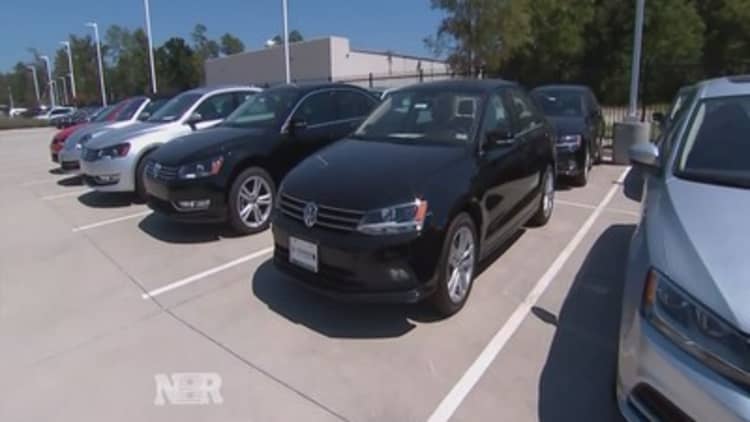
When the research firm Autodata reported the pace of U.S. auto sales for September was 18.17 million vehicles, the reaction was immediate.
This is as good as it gets for the automakers, observers said.
"Every contractor I see has a new vehicle. New cars on every block. Demand can't last too much longer," said Joseph Greiveldinger in Marietta, Georgia, in a tweet to CNBC.
Maybe, maybe not.
"Yes, we see auto sales getting stronger next year," said Mark Wakefield, managing director at the consulting firm AlixPartners. Wakefield, who runs the firm's automotive practice in the Americas expects U.S. sales to increase by another 300,000 vehicles next year. "We see sales next year at 17.4 or 17.5 million vehicles."
Six years into this current up-cycle for the auto industry, he said he believes many of the ingredients that fueled the steady growth are still driving people into buying a new car, truck or SUV.
- Employment: Despite softer numbers in September, unemployment is expected to remain relatively low.
- Old cars/trucks need replacing: The average age of vehicles in the U.S. is still climbing. It's currently over 11 years, according to IHS Automotive.
- Gas Prices: Most project them to remain relatively low, giving consumers a sense they have more money in their monthly budget.
Wakefield admitted conditions could change quickly. He pointed to interest rates as a perfect example. Right now, the average auto loan interest rate is 4.77 percent, according to Equifax, but that will likely change in 2016.
"Unless something dramatic happens with the Fed and interest rates, we see sales remaining strong," he said.
While business has seldom been better for auto dealers around the country, this is a cyclical industry and at some point there will be a drop-off in sales. Wakefield sees a gradual pullback in 2017 and 2018 followed by the biggest decline in 2019 when AlixPartners estimates annual auto sales will slip to 14.9 million.
"There will be a downturn someday and it will hurt," said Wakefield. Veterans of the auto industry know that day will eventually be here, but for now they are savoring a surge in sales the industry hasn't seen since 2005.
"If you would have told me five years ago that this level of auto sales and profits were possible, I wouldn't have believed it," said Wakefield.



